As part of my MA dissertation research into Brazil’s presidency of COP30 and Brazilian leadership, I was able to formulate and send to the COP30 Presidency a set of interview questions. My questions aimed to help me to understand the dilemmas posed to Brazil’s leadership of global climate change diplomacy by domestic agribusiness and the expansion of oil extraction, alongside facilitating effective participation by Indigenous peoples. I received their reply on the 19 of August 2025. Their responses give insight into what is at stake for the COP30 Presidency and how Brazil is practically navigating deep tensions to lead the most important climate summit of the decade. For this reason, in this blog I will be sharing the questions and answers I submitted.
1. Agribusiness is both a pillar of the Brazilian economy and the main historical driver of deforestation. How does the COP30 presidency plan to engage this sector in the negotiating process? Do you think it is possible to work with them as a constructive partner for the climate agenda?
The COP30 Presidency aims to foster dialogue with all segments of agribusiness, promoting solutions that reconcile economic growth with climate goals. Additionally, family farming will be highlighted as a constructive example, given its role in mitigating climate change through sustainable practices such as agroecology, agroforestry, efficient water use, and soil conservation. These approaches demonstrate that it is possible to engage the agricultural sector as a partner in advancing a climate-resilient economy.
See, also: “COP30 will include food sourced from family farming”
2. International observers and civil society point to an apparent contradiction between hosting the “Amazon COP” and the potential expansion of the oil exploration frontier at the mouth of the Amazon. How do the government and the COP presidency respond to this criticism and manage this tension in front of the global community?
The COP30 Presidency acknowledge the concerns but emphasize that, under the Paris Agreement, each country defines its path to phase out fossil fuels in line with its economic realities and net-zero commitments. NDCs cover the entire economy, allowing flexibility to balance emissions reductions across sectors. Therefore, energy transition is a gradual process, shaped by national contexts and financing challenges. The particular paradox is that each country will have a different path. There are countries that are totally dependent on fossil fuels in their economies and there are countries that are much less dependent. The formulas have to be developed case by case, and each country must have an economic and rational transition plan towards the net zero target by 2050.
3. The official discourse places indigenous peoples at the centre of the climate solution. In practice, what mechanisms are the COP30 Presidency and Brazilian policy implementing to ensure that indigenous participation and leadership are not just symbolic, but effective, and that their knowledge and rights influence decisions about the future of the Amazon?
The COP30 Presidency is committed to ensuring indigenous participation is substantive and impactful, recognizing their ancestral knowledge in managing forests and water cycles. A key initiative is the creation of a “COP Village” at the Federal University of Pará, designed to host around 3,000 indigenous participants from Brazil and abroad, which far surpasses the previous COP record of 350 participants, seen in Paris (2015) and Dubai (2023). This space will amplify indigenous voices, integrate their knowledge into climate debates, and strengthen their influence on decisions about the Amazon’s future. In the spirit of “mutirão”, Self-Organized Dialogues of the Global Ethical Stocktake have been promoted by the COP30 Presidency, fostering exchanges and dialogue on nature, art, and ecological integrity. These discussions are decentralized and have also underscored the role of society to nurture care and stewardship, bringing together indigenous, religious, political, and civil society leaders to reflect on collective solutions.
